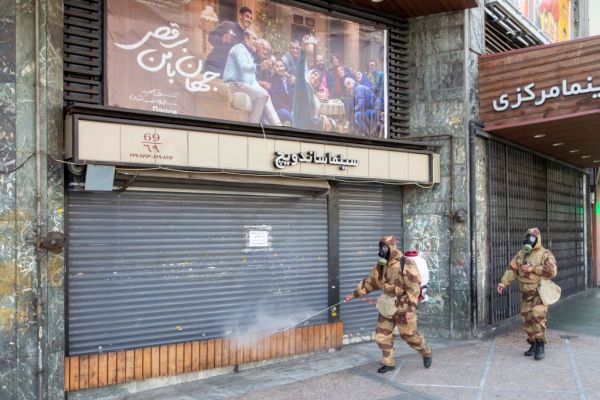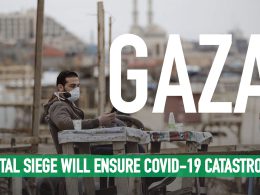By Dean O’Donnell
2020 got off to an alarming start with the US government assasination of Iranian General Qasem Soleimani. An act of imperialist aggression and the result of escalating tensions between both states, it posed a direct threat of war in the Middle East — a reminder of the deeply unstable period we are currently living through.
Now, not even three months later, the promise of a tumultuous year has come to fruition as the COVID-19 pandemic has plunged the world into crisis. The USA and Iran find themselves as two of the worst affected countries, both drastically unprepared to tackle its worst effects and already counting deaths in the thousands.
At the time of writing, the official figure for confirmed cases in Iran stands at 34,408 and the death toll at 2,517. However, it is likely that conscious underreporting on behalf of the government masks the true magnitude of crisis with the World Health Organisation suggesting the actual number could be five times as high. Among those stricken by the virus are its Vice-President, Minister of Health and a number of other senior politicians.
Criminal sanctions
The extent of the crisis in Iran is exacerbated by US imposed sanctions, several waves of which have economically crippled the country since their implementation in 2018 when Trump withdrew the US from the 2015 Iran nuclear deal.
Under the sanctions, US companies are banned outright from any commercial activity with Iranian businesses and financial institutions while companies and individuals from other countries face harsh penalties for doing so. Even before the outbreak the effects had been devastating: by the end of 2019 oil exports, on which the economy is dependent, plummeted; their currency halved in value; and soaring inflation saw a dramatic rise in cost of living.
Now, rather than lifting such sanctions in the midst of the current global health crisis, Trump has doubled down, eager to take advantage of any opportunity to undermine the Iranian regime. This has left the Iranian healthcare system unable to purchase the equipment necessary to prevent and treat the virus, such as facemasks and ventilators. Similarly, the importation of drugs or even supplies to produce their own drugs have been hampered by the sanctions, as many enterprises are unable or unwilling to trade with Iran.
Multiplying the death toll
As the Washington Post reported: “The Trump administration has also reduced the number of licenses it grants to companies for certain medical exports to Iran . . . The list of items requiring special authorization includes oxygen generators, full-face mask respirators and thermal imaging equipment, all of which are needed to treat patients and keep medical workers safe, doctors say.”
As a result medical staff have stated that “all aspects of prevention, diagnosis, and treatment are directly and indirectly hampered” and that on top of the deaths from the deadly virus, the sanctions are limiting the supply of other essential materials and will lead to the deaths of even more Iranians.
Despite calls by the UN to lift the sanctions, Trump instead cynically offered humanitarian aid, doing so not to relieve the devastating plight of the Iranian people but to deflect criticism of the sanctions, knowing all the while it would be rejected by the regime.
Oppose imperialist murder
We should be clear that these sanctions in the context of the pandemic are tantamount to an act of biological warfare, one which the Iranian working-class and poor will bear the brunt.
Socialists oppose all forms of imperialist intervention and demand the sanctions be immediately lifted. We must also be clear that the repressive theocratic regime in Iran is no friend of the Iranian working class and poor who in 2017 and 2018 rocked the country with waves of protests against the regime’s neoliberal policies.
Socialist & workers’ alternative needed
Trump’s belligerence will be used by the regime to shore up anti-US sentiment in an attempt to deflect from its own brutal rule as it momentarily did in the aftermath of Soleimani’s assasination, when millions of Iranians were drawn onto the street mourning the death of the powerful general.
However, this display of national unity was fleeting and unable to paper over the deep class divisions that exist in Iranian society. Weeks later, after Iranian military forces shot down a Ukrainian plane killing all passengers on board and for which the government denied all responsibility, anti-government protests once again erupted.
The damage now being inflicted on the population could be devastating, and the only force that can offer any way out is the working class in Iran — in the first instance the frontline workers in essential services, not least the medical workers. When the immediate crisis does pass, as it will, a new united movement of the working class in Iran will be essential to removing the autocracy, and through international working-class solidarity, rebuffing US imperialism.
A socialist programme to take public ownership and democratic control of Iran’s vast economic and natural resources, and use it in a democratic and planned way for the benefit of all will be key to such a movement. Imperialist and capitalist domination of the region offers only a future of continuing war, impoverishment and misery for the mass of its people.












